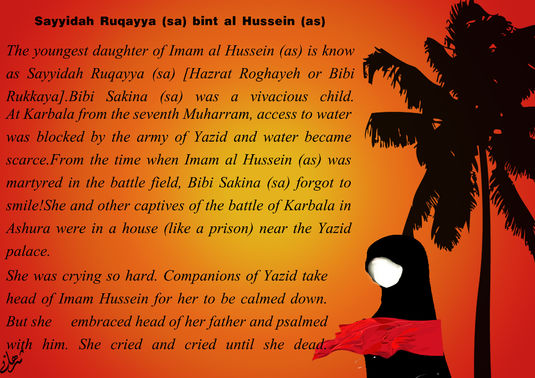ashura
shia
muslim
True Islam
imam hossain
imam hosayn
ashura & shia & realy islam

Hussain - the Universalist
Hussain (4-62 AH. - 614 AD.) was the youngest son of Ali (A.D. 600-661) by Prophet Mohammed"s daughter Fatimah. Ali was the first caliph of islam When Yazid, son of Muawiyah, became Caliph he demanded allegiance from Hussain. He refused because of Yazid"s wayward ways. Ultimately he had to confront Yazid. It had to be done, to preclude any further deterioration and eventual disintegration of Islam. He had to clear up the damage -the transgression of Islamic values, the frivolous social behaviour, in the name of Islam - the sickening dashing of dreams about future glories of Islam. Hussain had no illusions about the extent of that damage. Was it to ask too much of Hussain to take the responsibility? Certainly not. He as the Prophet"s grandson had to do his duty. But there was no easy option for him. He had to bear the brunt. When a situation of this kind arose, a very heavy burden fell on Hussain.
Atonality from Yazid"s degenerated symphony
Little wonder that Hussain"s patience snapped when the Caliph firmly demanded allegiance. He realised that the consequences of this prolonged anarchy in Islam and a shattering triumph for immorality would permanently deface and disfigure the true faith and a pseudo-religion would emerge under the guise of Islam. Blasphemy would be practised till it dulled the senses and mob psychology took over. Religion would be compromised and its long term effects disregarded.
But for the men behind Islam, with their eyes on the future, this was not to be tolerated at any cost. They had to act before it was too late to halt or reverse the inexorable decline.
Hussain intensified his campaign. He was determined to accomplish his mission by means more vigorous than had hitherto been used. He deserves full credit for the exemplary courage and aplomb with which he handled the ugly situation. He did not resort to aggression yet firmly resisted Yazid"s bluster.
Can man stand up to these conditions? When the scene moved to the battle-field of Kerbala, Hussain managed to say daringly: "Man can - but not necessarily with ease He, and a small group of followers including his immediate family were mercilessly massacred. The day of this tragedy is universally commemorated every year and is called "Ashura" (10th Muharram, Islamic calendar) and is marked by processions and mourning. It is observed as a national in holiday certain countries.
Hussain is buried in Kerbala (Iraq). His holy shrine is visited by millions of people, from all over the world, as a mark of veneration.
It is in the very nature of great reformers that they belong to everybody, everywhere. Hussain"s noble deed is so relevant to the entire human race, that I am sure there is a far bigger audience waiting for him somewhere than the one he has already. All that is required is to draw people"s attention.
The contemporary society, irrespective of race and religion, would do well to have a closer look at the Hero of Kerbala as his message transcends the barriers of caste and creed, race and religion. Advocates of human rights, sociologists, reformers, theologians, all included, will find "delightful wisdom, sweet instructions, and a meaning suited to their mind", in his story. His message is certainly not an exclusive preserve of any particular group. It embraces the entire human race. It was not a power struggle. Hussain persistently and explicitly expounded: "what matters to me is to "correct", not conquer" - an affirmation that he would die in the firm belief that a despot"s idiosyncrasies could never be an effective instrument of religious policies.
to be continued in library.tebyan.net/f
?Who is Hussain pbuh? What is karbala? What is Ashura
www.al-islam.org/sto
english.tebyan.net/n
library.tebyan.net/f
..................................
ashura
shia
muslim
True Islam
imam hossain
imam hosayn
ashura & shia & realy islam
:Source






